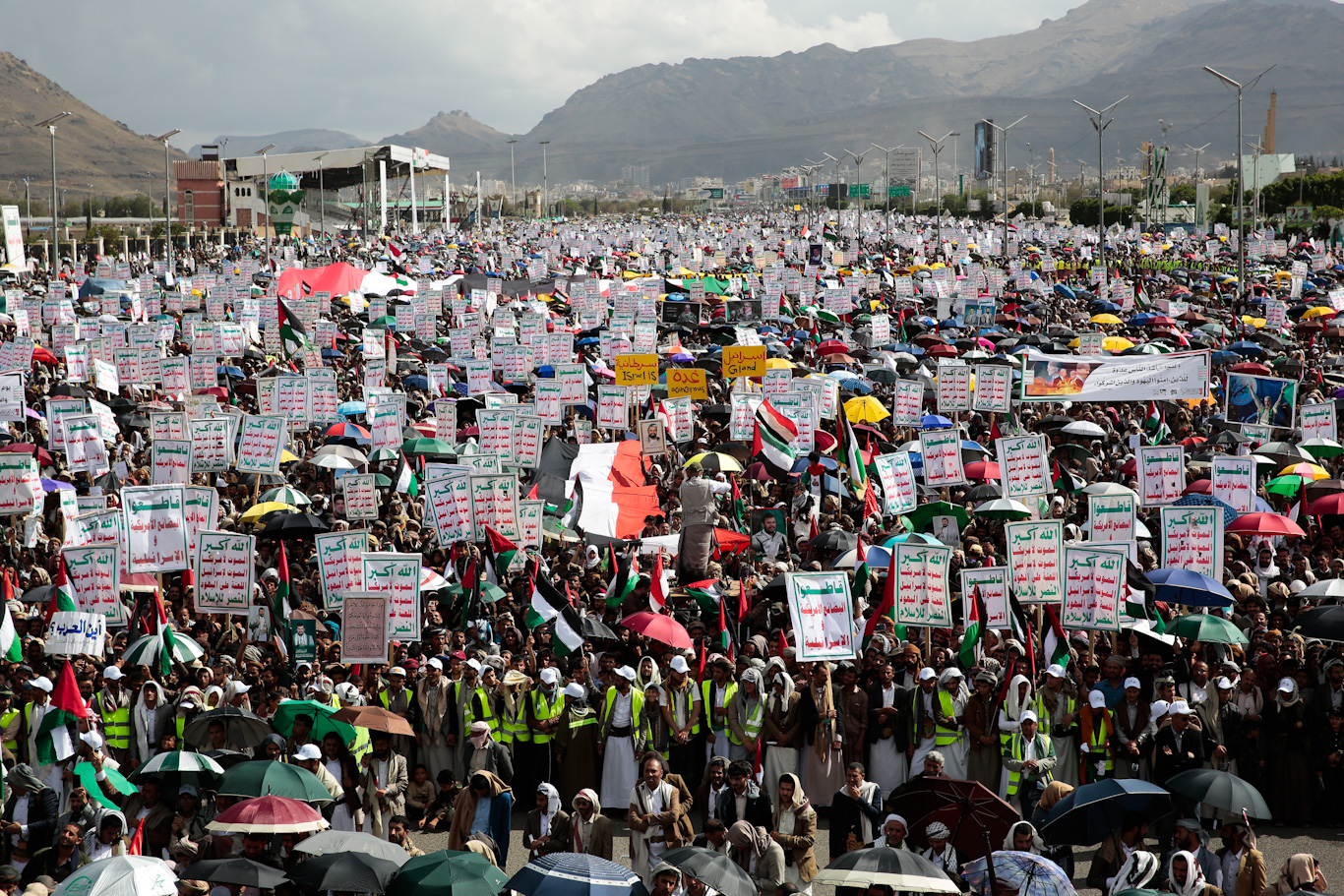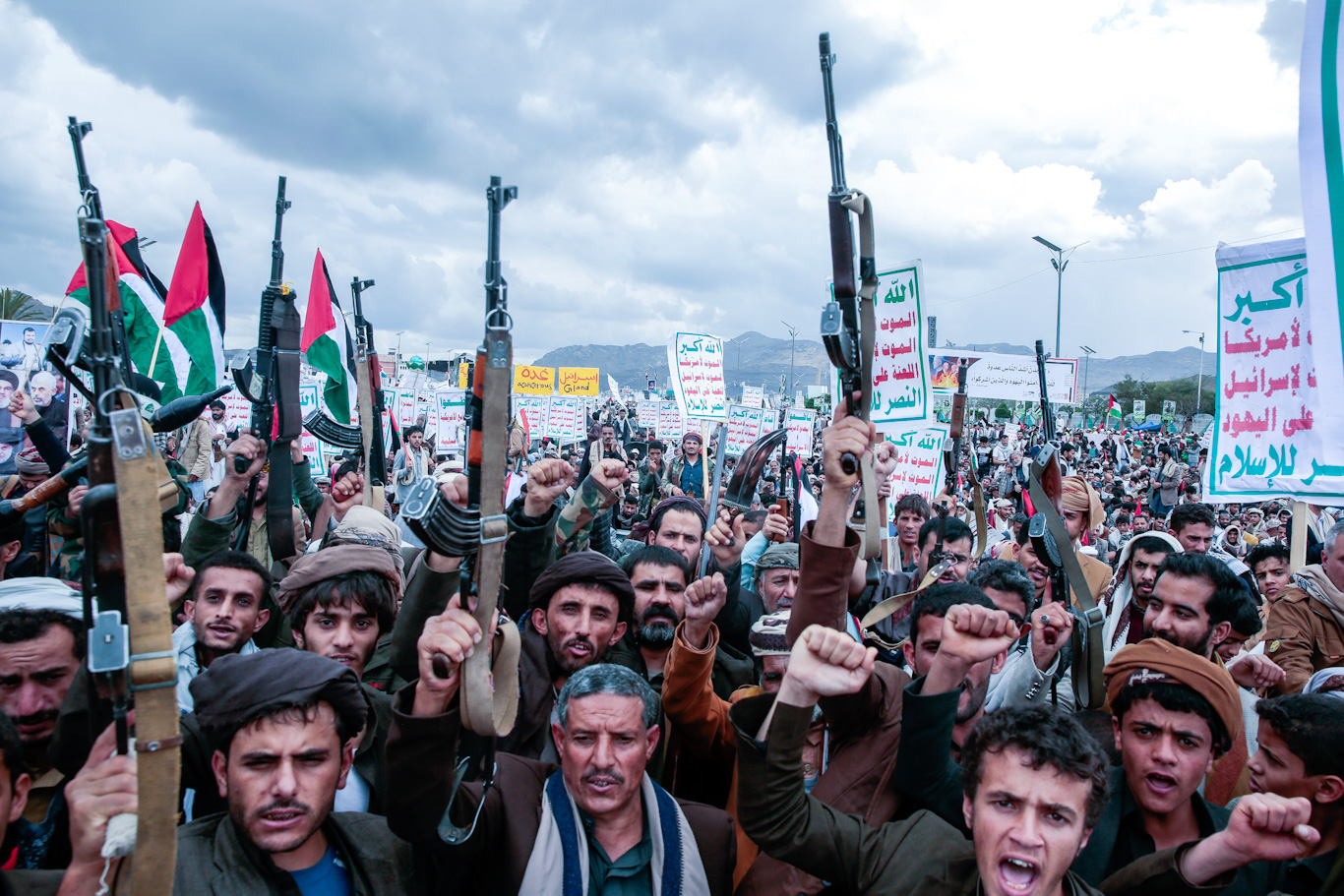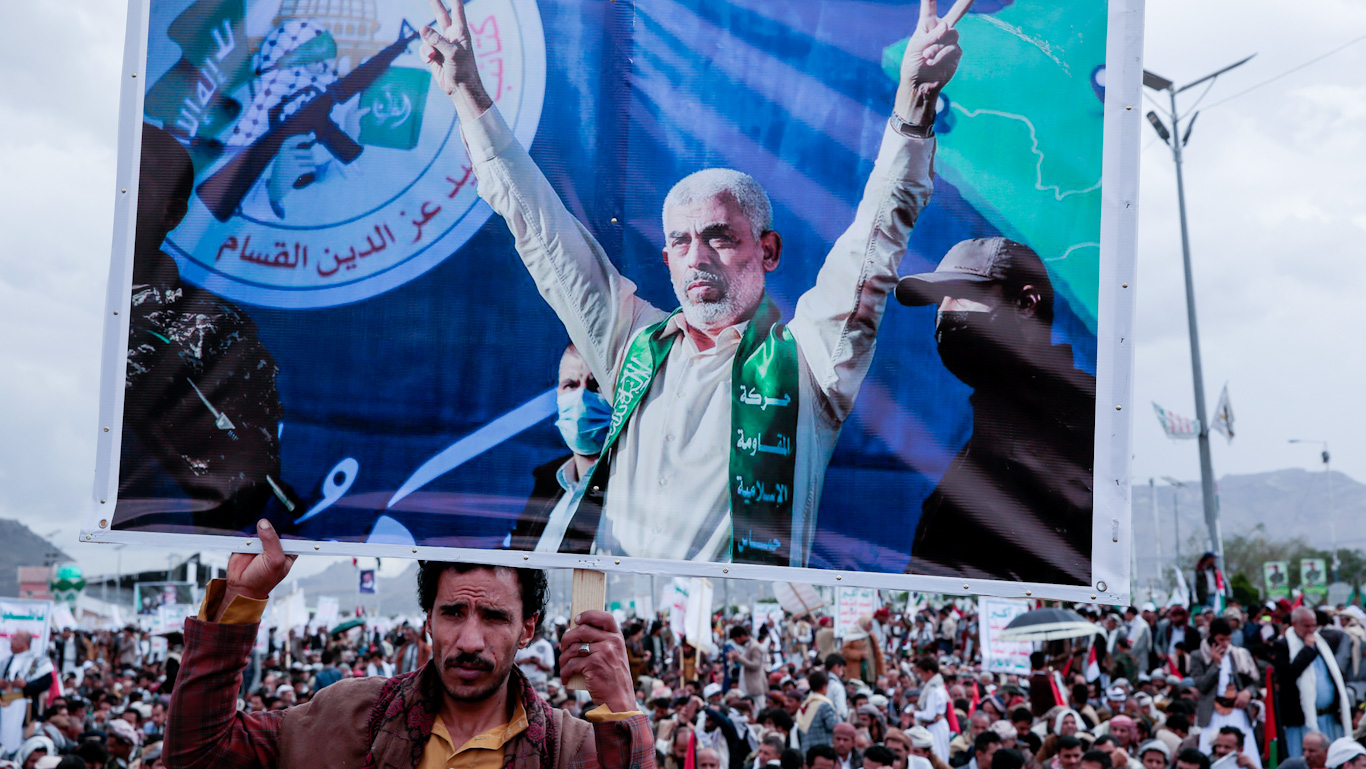On International Quds Day, when protests are held around the world to show solidarity with Palestinians, Yemenis are once again at the forefront of worldwide solidarity with Gaza. Yemenis of all stripes took to the streets in unprecedented numbers on Friday to demonstrate their support for Palestine as well as Ansar Allah’s (Houthis) Red Sea operation against Israeli, American and British ships until the war in Gaza is stopped and the blockade is lifted. This year’s protests came as the Biden Administration embarked upon new moves aimed at Yemen’s Central Bank in a bid to pressure Ansar Allah to stop targeting Israeli ships.
The annual event, which falls annually on the last Friday of every Ramadan and sees rallies held across the globe in support of the Palestinian cause, is especially meaningful this year as Israel’s war against Gaza rages on. With the largest rallies taking place in Yemen’s capital city of Sana’a, over 130 cities and squares throughout Yemen filled hundreds of thousands on Friday carrying Palestinians, Yemen and Lebanese Hezbollah flags and carrying banners blaming the United States for the ongoing war in Gaza.
 The collective voice of the demonstrations was unified to renew their commitment to Palestinians, to stress that the Palestine issue is the most important to Yemen, that Yemen must take the initiative to liberate it whatever the cost and to call on Muslims around the world to boycott Israeli products.
The collective voice of the demonstrations was unified to renew their commitment to Palestinians, to stress that the Palestine issue is the most important to Yemen, that Yemen must take the initiative to liberate it whatever the cost and to call on Muslims around the world to boycott Israeli products.
On March 26, the head of Yemen’s Supreme Political Council reaffirmed in a ceremony in Sana’a on the occasion of the ninth anniversary of the Saudi-led war on Yemen that the country’s maritime operations in the Red Sea against Israeli-linked ships will only cease when Tel Aviv’s crimes in Gaza stop, “The only way to stop Yemen’s operations is to stop genocide and violence against the oppressed people of Gaza,” he said.
This year, a new significance
Friday’s protests were unique as they not only attracted crowds from across Yemen’s diverse political and social spectrums: Shafi’i, Zaydi, Salafist and Muslim Brotherhood, but also thousands of former allies of the Saudi-led coalition, who put down arms and joined Ansar Allah following the party’s reaction to the Israeli aggression on Gaza and U.S. support for Tel Aviv.
“By God Almighty, it is an honor to be in AlSabeen Square for supporting Gaza. I deeply regret the past days in which I was on the side of the U.S. allies,” protester Ahmed Mohamed Binh told MintPress. Binh was one of the leaders of the Saudi-led coalition in Marib and a staunch opponent of Ansar Allah. Yet, he returned to Sana’a after announcing that he had joined Ansar Allah because of their support for Gaza. Today, he is one of the most vocal advocates for commemorating Al-Quds Day in Sana’a.

Ironically, the aggression against Gaza and the American participation in the ongoing massacres have made Yemenis more united than ever while increasing the popularity of Ansar Allah not only in Yemen but across the world. Activists, jurists and politicians have applauded and described them as heroes trying to stop genocide in Gaza. This is despite nine years and billions of dollars spent by Saudi Arabia, the Emirates, and the U.S. to contain Ansar Allah.
This year’s Quds Day rallies fall three days after a pro-Palestine conference titled “Palestine the Central Cause of the Nation” was held in Sana’a. The four-day conference discussed the Quranic vision of the Palestinian cause, the struggle of Yemenis in Palestine throughout history, the importance of economic boycotts, and Yemen’s political, military, and popular role in supporting Gaza.
Participants from around the world who stand in solidarity with Palestine joined the conference remotely. On the first day, televised speeches were delivered by British politician and parliamentarian George Galloway, Russian philosopher and advisor to President Vladimir Putin Aleksandr Dugin, South African parliamentarian Zulivlele Mandela – grandson of late South African leader Nelson Mandela and Indian writer and political activist Tushar Gandhi, grandson of the spiritual leader of India Mahatma Gandhi. Representing Cuba was Elida Guevara, daughter of Che Guevara.
The conference comes as Ansar Allah is making preparations to host leaders of Palestinian resistance movements, particularly leaders from Hamas, in the event that they are expelled from Qatar due to American pressure.
Taking the war to the bank
The demonstrations were not just aimed at the Palestine issue. They challenged the U.S. role in Yemen, most recently attempts by the Biden Administration to force Yemeni banks to relocate their headquarters from the capital, Sana’a (where Ansar Allah is based), to Aden, home to a number of groups allied with the U.S. On Tuesday, the Central Bank of Aden, run by Washington’s allies, issued a decision requiring banks to transfer their headquarters to Aden, threatening to implement the Anti-Terrorist Financing Law against any bank that violates the decision.
The decision used the U.S. classification of Ansar Allah as a terrorist organization to justify the move, which allegedly came in response to a new 100 riyal coin issued by the Sana’a Central Bank to replace damaged 100 riyal bills. However, the justification is inconsistent with the decision of the Central Bank in Aden. The new currency issued by the Central Bank in Sana’a did not affect exchange rates. Economists have confirmed that it is not new money being created, but rather a substitute for damaged banknotes, and therefore, the banking system was not affected.
Abdul-Malik al-Ajr, a negotiator for the Yemeni delegation, said of the move, “What occurred was the normal process of replacing damaged currency, not printing a new one. This is a normal procedure that all governments carry out periodically, but because of the war and the siege, Yemen was unable to replace this damaged currency, and it became a problem for many residents, especially in grocery stores, taxis, public transportation, bakeries and water stations.”
Following the announcement of the new coin, citizens flocked to exchange points set up by the Central Bank in Sana’a. The currency was minted according to international standards, and the process of issuing it will not affect the exchange rates because its distribution will depend on replacing the damaged one by replacing each damaged 100 note with a 100 coin,” the Central Bank in Sana’a said in a statement.
Ansar Alla’s spokesperson, Muhammed Abdul Salam, said of the move, “Printing a one hundred riyal coin is not in vain, but rather a necessary step taken as a substitute for a damaged paper currency. We wonder why America and European countries are upset as a result of what the Central Bank of Yemen has done in partially addressing the situation of the national currency, which has been subjected and is [stll] being subjected to a brutal war by the coalition and by America itself.”

Yemeni financial experts told MintPress that the United States Agency for International Development recently supervised the development of new systems for the Central Bank in Aden, including the “Unified National Network,” a financial transfer system. The Central Bank in Aden has asked banks, exchange companies, and transfer companies to join that system exclusively. For the U.S., this means that it will be able to access financial and banking data and financial transfers.
Al-Tadamum Bank, the Bank of Yemen and Kuwait, the Al-Amal Microfinance Bank, the Shamil Bank of Yemen and Bahrain, and the Al-Kuraimi Islamic Microfinance Bank, which together comprise over 80% of Yemen’s bank accounts, have already joined the Unified National Network.
The decision by the Biden administration to designate Ansar Allah as a “Global Terrorist group” has already harmed thousands of Yemeni families, as many international banks, exchange shops, and firms have already ceased participating in commercial or financial transactions with Yemenis due to the fear of triggering U.S. sanctions. Nearly 80% of Yemenis live in areas under AnsarAllah’s control, including the country’s capital, Sana’a’a and the major port of al-Hodeida. Consequently, the U.S. economic pressure will inevitably push more Yemeni civilians closer to famine.
Feature photo | A Yemeni man holds a poster of Yahya Sinwar, head of Hamas, during a protest marking Quds Day in support of Palestinians in Gaza, Sanaa, Yemen, April 05, 2024. Osamah Abdulrahman | AP
Ahmed AbdulKareem is a Yemeni journalist based in Sana’a. He covers the war in Yemen for MintPress News as well as local Yemeni media.


